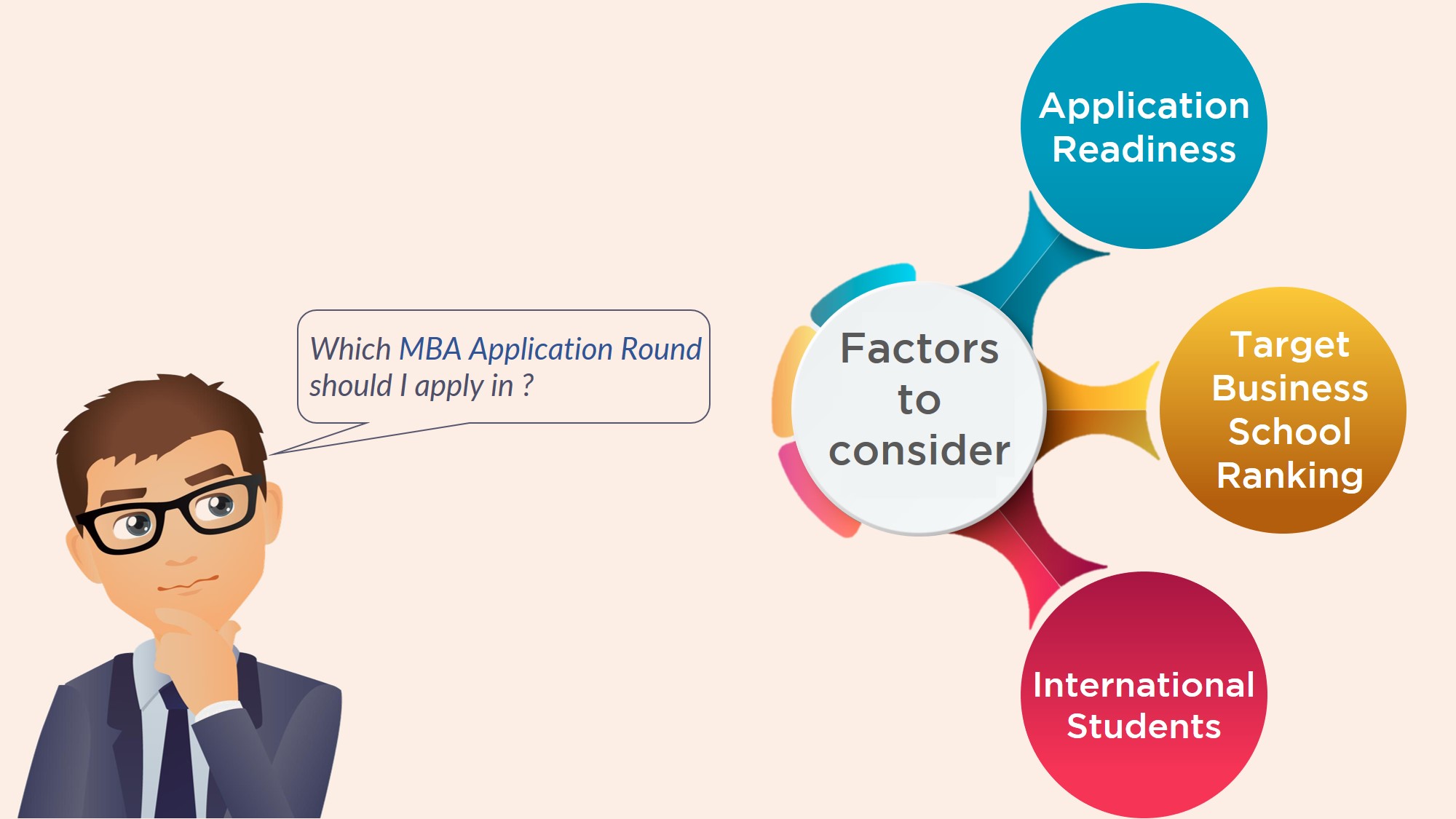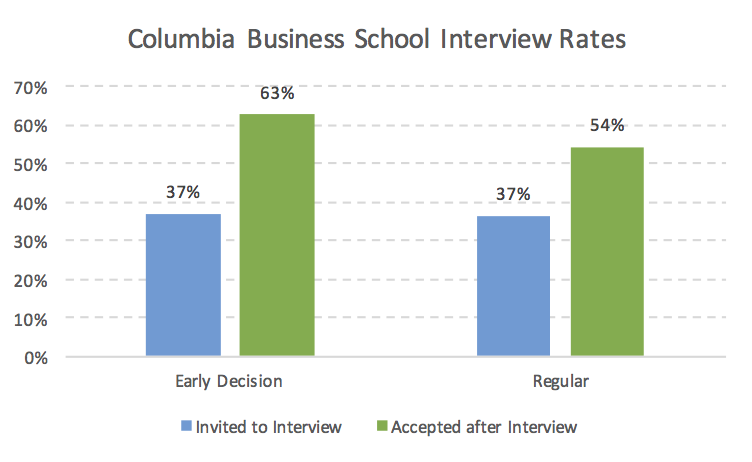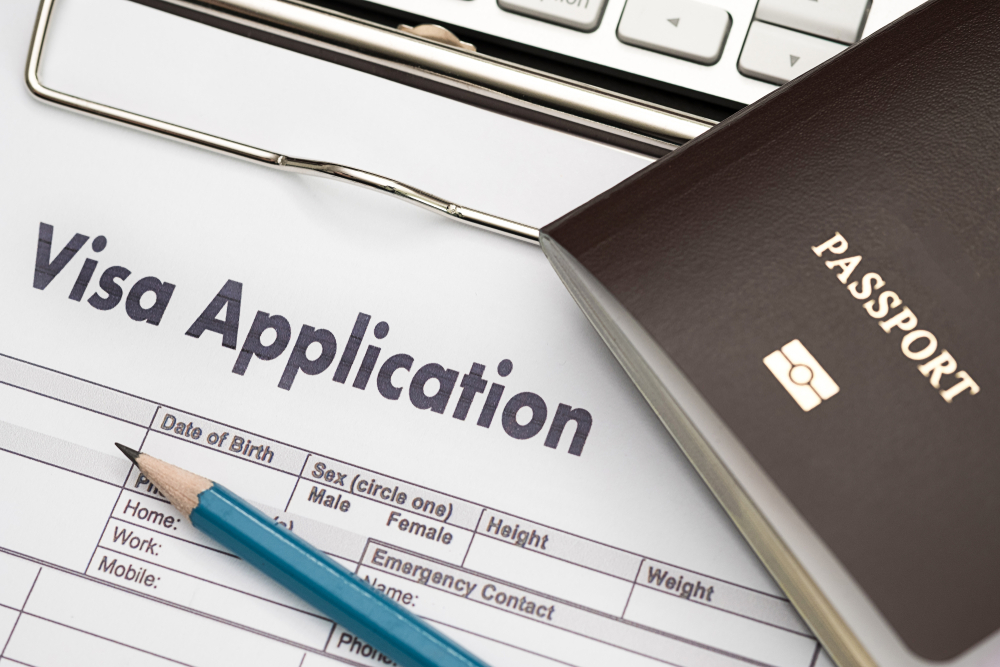Which MBA Application Round should I apply in? The answer to this question lies in understanding the advantages and disadvantages of each MBA application round. Many candidates often remain confused about applying early or waiting until the last round. However, chances of admission depend not only on which MBA Application Round you apply but also on the quality of the application that you come up with. The rule of thumb you should follow is “Plan well in advance and apply as early as possible to ensure your best foot forward.”

In this article, we’ll look at how you can decide the suitable MBA application round to maximize chances of admission. Here is the outline of this article:
- What factors should I consider while deciding which round to apply in?
- Expert Advice – What do Business Schools and MBA admission Consultants say?
- MBA Application Round 1 – Advantages and Disadvantages
- MBA Application Round 2– Advantages and Disadvantages
- MBA Application Round 3– Advantages and Disadvantages
- MBA Acceptance Rate by Round of top Business schools (2014 – 2018)
- Business Schools showing little or no disadvantage during Round 3/ Round 4 applications
- In which MBA application round should international candidates apply?
- Takeaways | Which MBA Application Round to apply?
Factors to consider – Which MBA Application Round should I apply in?
The decision of choosing the most suitable MBA Application round depends on these factors
- Application Readiness
If you are satisfied with your GMAT score, have a polished resume, and, have really good letters of recommendation, then Round 1 is your best shot. In case you feel you need additional 2-3 months to improve your application, then submit your application by Round 2. In case, you have an extraordinary profile and have a solid reason for waiting till Round 3 then, this round will be suitable for you.
- Target Business School Ranking
If your target Business School is one among the top 15, then applying in Round 1 or 2 is absolutely essential. Why? Because the acceptance rate for these business schools is significantly lower for Round 3 as compared to the first 2 rounds. More on this in the latter part of the article.
- International Students
As international students have to spend extra time on Visa applications and other related formalities, it is better to apply in either of the first 2 Rounds.
Expert Advice – What do Business Schools and MBA admission Consultants say?
 Most top Business Schools except a few, typically say that there’s no preference for Round 1 vs Round 2. But, they still do not encourage applying in Round 3. The biggest example of this fact is Harvard Business School eliminating its third round of application.
Most top Business Schools except a few, typically say that there’s no preference for Round 1 vs Round 2. But, they still do not encourage applying in Round 3. The biggest example of this fact is Harvard Business School eliminating its third round of application.
However, Tier 2 Business Schools have a higher acceptance rate in Round 3 as compared to Round 1 and 2. More on this later.

Columbia Business School, which prefers candidates applying in their early decision round. CBS reviews applicants on a rolling basis and early decision candidates are given decisions before regular decision candidates. But, you also have to sign a commitment to attend CBS and withdraw all other MBA applications. You also have to pay a $6,000 non-refundable tuition deposit within 2 weeks of admission
Most MBA admission consultants offer solid advice on which rounds of application are meant for which type of candidates. Let’s take a look at what they really advise students on different MBA application rounds.
For any strategic advice for GMAT or MBA Admissions, write to us at acethegmat@e-gmat.com. Take a free trial and get unlimited access to concept files, live sessions, and practice questions
MBA Application Round 1
This round is most suitable for those applicants who are well prepared with their MBA applications. They are satisfied with their GMAT scores and have been working on their essays for a considerable amount of time. Their resumes highlight extracurricular activities and leadership positions held by them.

Who should apply in Round 1 of MBA admissions?
Applying in Round 1 is a great idea if you have a great GMAT score, have engaged your recommenders, and are confident that you’ll be able to draft solid application documents in advance of the deadline.
Over-represented populations such as mid-market private equity professionals, management consultants, and Indian engineers also benefit to a certain extent from applying in Round 1. Since people in these demographics make up a proportionally higher number of MBA applicants, you need to get your foot in the door as early as possible.
Advantages – Applying in round 1 increases your chances of admission as:
- It shows serious intent and planning to the admission committees
- It also conveys that a particular business school is your first preference and their admission committee could reward you with an admit as well as a scholarship
- You are compared with applicants from round 1 only
- Applying in this round gives you a chance to apply in other programs in other rounds if you’re not admitted in round 1
Disadvantages
- This round witnesses strong applications. There are higher chances of getting wait-listed in round 1
- If you feel your application needs improvement at this point, it’s better to apply in Round 2
Do you know what makes you postpone your MBA Application? An unsatisfactory GMAT score. One of the reasons for this can be the choice of your test center. Learn how to choose a GMAT test center
Aayush was waitlisted with a 710. After scoring a 750 he received admits from Columbia and Michigan Ross.
If you want to score 750+ on the GMAT, we can give you access to quality online content to prepare. We are the most reviewed GMAT prep company on gmatclub with more than 1950 reviews. Why don’t you take a free trial and judge it for yourself?
MBA Application Round 2
This round is most suitable for students who don’t have compelling applications till the round 1 deadline. For the next 3-4 months, they should put in an effort to improve their GMAT scores or their resume by seeking leadership positions at work, extracurricular activities, and volunteer work.

Who should apply in Round 2 of MBA admissions?
Applying in Round 2 is for you if you haven’t had time to craft a solid application. Your time is precious and we know you’re working a 50-hour+ work week, plus time spent with your family and friends, volunteer work, and hobbies.
If you have any doubt that your application or essays need more work, block out time to work on it every week and plan to hold off until Round 2. Regardless of your background, you should avoid applying in Round 1 if you think you need more time to draft solid application documents.
Do you think you could meaningfully improve your GMAT score with a bit more time to study? Then waiting is for you. Use your time wisely to do targeted tutoring so you can make the most out of every study session.
Advantages
- A lot of applicants get a chance to visit the campus, which helps them to convey their program fit to the admission committees
- It is more favorable for candidates with less than perfect applications as most of the strong applications are submitted in round 1
- If you get an admit in this round, it becomes easier for you to move on to the next phase of your life. You have enough time for putting in your notice periods at your jobs.
- In case your application is rejected, you’ll have ample time to strategize for next year
Disadvantages
- Among all the rounds, the highest number of applications are submitted in this round. Therefore, the competition is fierce.
- You are compared with round 2 applicants as well as selected applicants from round 1.
- The chance of getting wait-listed are low as compared to round 1
MBA Application Round 3
This round is the most competitive one. Business schools have a few seats left and they are willing to offer it to you if you have a highly compelling application. At this point, a few Business schools also expect an additional essay on why you chose to wait until round 3 to apply. Business schools also review wait-listed applications in this round. In short, this round is reserved for wait-listed and “exceptional” applicants. So, until and unless circumstances forced you to apply in round 3, don’t wait till this round.

Who should apply in Round 3?
Unless you can make yourself stand out with an impeccable GMAT score or through your extraordinary leadership experiences and volunteer work, it’s best to focus on getting your applications into your choice of schools within the first two rounds.
You might also consider Round 3 if you had personal emergencies or exceptional circumstances such as army service that kept you from applying in Round 1 or Round 2.
Advantages
- Tier 2 Business Schools have a higher acceptance rate in Round 3/ Round 4. If you don’t want to wait for one more year, applying to these Business Schools will surely work to your advantage. Look at the table on MBA acceptance rates of Business schools by round.
Disadvantages
- You are compared with accepted and wait-listed applicants of Round 1 and 2
- If you belong to a generic pool of applicants, then your application might not be compelling at this point
- It is highly unlikely any admission consultant would be willing to help you with this MBA application round
Round 1 vs Round 2 vs Round 3 Acceptance Rate (2014 – 2018)
The below statistics are based on self-reported data from gmatclub. The acceptance rate is the average from the year 2014 to 2018.
| S. No. | Business School | Round 1 | Round 2 | Round 3 | Round 4 |
| 1 | Harvard Business School | 13% | 9% | – | – |
| 2 | The Wharton School | 17% | 16% | Low Data | – |
| 3 | Booth School of Business | 26% | 23% | 13% | – |
| 4 | Stanford Graduate School of Business | 8% | 6% | 3% | – |
| 5 | Kellogg School of Management Northwestern University | 22% | 20% | 13% | – |
| 6 | Sloan School of Management MIT | 18% | 10% | Low data | – |
| 7 | Haas School of Business | 14% | 14% | 6% | Low data |
| 8 | Tuck School of Business | 26% | 24% | 20% | 7% |
| 9 | Columbia Business School | 20% | 16% | – | – |
| 10 | Yale School of Management | 21% | 21% | 11% | – |
| 11 | Ross School of Business, University of Michigan | 26% | 31% | 24% | – |
| 12 | NYU Stern School of Business | 19% | 22% | 22% | Low data |
| 13 | Duke’s Fuqua School of Business | 24% | 23% | 15% | – |
| 14 | Darden School of Business | 29% | 28% | 13% | – |
| 15 | UCLA Anderson | 19% | 22% | 9% | – |
Applying in Round 3 of MBA application for the top 15 Business Schools might not be a good idea. These Business Schools show a significant drop in the acceptance rate in Round 3 applications.
Business Schools showing little or no disadvantage during Round 3/ Round 4 applications
You can see that for the majority of the top 15 Business Schools, applying in Round 3/ Round 4 is a disadvantage, except for NYU Stern, Ross, and Tuck.
However, there are a few colleges that have higher acceptance rates in round 3, which are as follows
|
Business Schools with a high acceptance rate in Final Round(s) |
|
| Business School | Round 3/Round 4 |
| Johnson (Cornell University) | 30% |
| McCombs (University of Texas) | 24% |
| Kenan-Flagler (University of North Carolina) | 38% |
| Tepper (Carnegie Melon) | 34% |
| Goizueta (Emory) | 25% |
| McDonough (Georgetown) | 32% |
| Kelley (Indiana University) | 34% |
| Olin (Washington University) | 28% |
| Carey (Arizona State University) | 37% |
| Owen (Vanderbilt University) | 45% |
In which MBA application round should international candidates apply?

If you are an international applicant, it is always better to apply for Round 2. Applying in Round 3 gives you less time for formalities related to immigration to the country where your B-school is situated. Most of your time will be consumed by Visa applications and scholarship applications. The chance of getting an MBA Scholarship is much more if you apply early. Therefore, it’s always better to apply as early as possible.
Takeaways
- Decide your MBA application round based on your application readiness, Target Business school ranking, and if you are an international applicant.
- If you have been working on your application for the last few months, have an envious GMAT score, a compelling essay, and an impressive resume, apply in Round 1
- If you feel you need to improve some aspects of your application (GMAT score, extracurricular activities, leadership positions held, etc.) apply in Round 2
- Don’t wait until round 3 to apply unless you have an extraordinary and non-generic profile and had exceptional circumstances preventing you from applying in MBA application Round 1 and 2
After reading this article we are sure you would have the answer to the question – “Round 1 vs Round 2, Which MBA Application Round should I apply in.” Remember, a solid MBA application submitted in Round 2 is superior to an average MBA application submitted hastily in Round 1. You should be confident about your application first. Only then you should decide on “Which MBA application round should you apply in.” For any further doubts, you can write to us at acethegmat@e-gmat.com and our Strategy experts can help you out.














